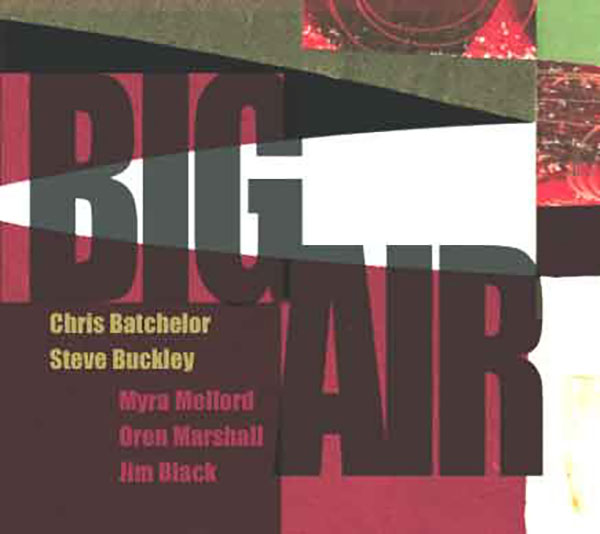
by Ian Mann
March 06, 2009
/ ALBUM
This inspired transatlantic alliance create music that is both highly adventurous and eminently listenable
This is the long awaited début recording of the exciting transatlantic collaboration led by ex Loose Tubes members Chris Batchelor (trumpet, electronics) and Steve Buckley (alto sax, bass clarinet, whistles). They are joined by another Brit in the form of the extraordinary tuba player Oren Marshall plus two guests from the New York Downtown scene, Myra Melford (piano, harmonium) and Jim Black (drums).
Big Air initially convened in 2001 as the result of a commission by the BBC’ s flagship jazz programme Jazz On 3. The resulting suite, the award winning “Ten Tall Tales”, made a big impression when it was broadcast and the quintet subsequently undertook a short British tour.
A genuine rapport developed between the players and Big Air re-united in 2005 for a memorable performance of the suite at the London Jazz Festival. Their latest UK appearance was at London’s Vortex in November 2008.
“Big Air” the album draws upon the core elements of “Ten Tall Tales” but also adds extra improvisations and overdubs. The composing credits are divided pretty much equally between Batchelor (four tunes) and Buckley (three) and the album can also be seen as a development of the ideas expressed on the pair’s 1999 Babel release “Life As We Know It”.
“Big Air” is a heady brew ,bringing together seemingly disparate elements but making everything work through a combination of a shared spirit of musical adventure and great technical skill. There is a real bravado about the playing on this album and a sense of fun that reflects Buckley and Batchelor’s Loose Tubes lineage.
Buckley’s rousing opener “The Wizard” is driven by Marshall’s insistent tuba vamp and Black’s crisp drumming. Melford’s piano has a free role that has invited comparisons with Cecil Taylor-or maybe Keith Tippett if you want a British equivalent. With no bass player present Marshall’s tuba often fulfils a rhythmic function but there is far more to his playing than that as listeners to his astonishing solo albums “Time Spent At Traffic Lights” and “The Introduction To The Story Of Speedy Sponda” will attest. John Fordham’s description of him as the “Jimi Hendrix of the tuba” is spot on. Meanwhile the horns of Buckley and Batchelor swoop and soar over the forest of sound created by their colleagues, sometimes tussling in counterpoint and throwing in a sly quote from Duke Ellington’s “Caravan”. Dazzling, invigorating stuff.
By contrast Batchelor’s “Song For The Garlic Seller” opens with electronically treated and looped horn overdubs, ghostly whistles and eerie piano tinklings. It’s strangely beguiling and beautiful but then the mood is broken by deranged circus/military music, all braying horns,skittering crazed piano and earthy tuba rasps from Marshall. This kind of musical schizophrenia is typical of Big Air but works brilliantly. Again this juxtaposition of moods and styles harks back to Loose Tubes and also Django Bates’ solo projects, many of which involved Buckley and Batchelor.
Also from the pen of Batchelor comes “Airlock” which incorporates a kind of warped funk groove laid down by Black and Marshall as Buckley solos eloquently above, later joined by Batchelor’s flaring trumpet. As the rhythmic grooves and interlocking horns mesh together in hypnotic fashion the overall effect is wholly invigorating.
Buckley’s “All Good Things” throws a kind of skewed mariachi music into the mix evoking comparisons with Charlie Haden’s Liberation Music Orchestra. As previously it’s amazing stuff, particularly Buckley’s remarkable bass clarinet and Marshall’s astonishing tuba sounds.
The introduction to Batchelor’s “The Road, The Sky, The Moon” introduces the other worldly sound of Melford’s harmonium which forms a haunting, droning backdrop for Batchelor’s pensive, Milesian trumpet, Marshall’s lugubrious but agile tuba and Buckley’s deep, woody bass clarinet. Black provides the subtle rhythmic pulse for this perfect atmospheric mood piece.
Back to the pen of Buckley for “The Trap” and an immediate increase in energy levels. Black and Marshall establish a terrific groove, the tuba bubbling ominously alongside the whiplash drums. It’s tailor made for Buckley and Batchelor to solo over which they do with aplomb before the mood of the piece subtly shifts, culminating in Melford’s delicate,lyrical piano solo.
Finally comes “Bracken”, the fourth contribution from Batchelor. Melford’s piano runs the full gamut, from the lyrical intro to the kind of thunderous chording and jagged runs she injects elsewhere on the album. Her “libero” role means that she is effectively the album’s wild card but paradoxically her playing is the glue that holds it all together. “Bracken” also contains the extraordinary electronically distorted sounds of Marshall’s tuba, reminiscent of everything from theramin to electric guitar. After the Marshall storm comes the calm of Batchelor’s thoughtful trumpet musings as the mood shifts yet again and the piece comes full circle.
“Big Air” is a remarkable album, literally bursting with ideas. The sudden shifts in moods and styles don’t make it the easiest of albums to write about, most of the tunes end up in a completely different place from where they started out. But that of course is half the fun, each track is something of an adventure and proof that at it’s best jazz can still be the sound of surprise. The free and written elements complement each other perfectly to create an adventurous brand of music that is still eminently listenable.
The group is due to make another short UK tour in November 2009. This marvellous album certainly whets the appetite. Bring it on.
blog comments powered by Disqus